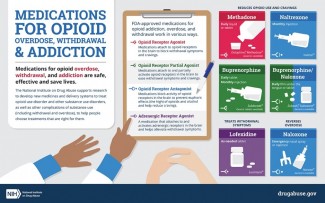Medications for Opioid Overdose, Withdrawal & Addiction
Submitted by Edie
-

This infographic shows the different types of medications prescribed for opioid overdose, withdrawal, and addiction.
Medications for opioid addiction, overdose, and withdrawal work in various ways.
- Opioid Receptor Agonist: Medications attach to opioid receptors in the brain to block withdrawal symptoms and cravings.
- Opioid Receptor Partial Agonist: Medications attach to and partially activate opioid receptors in the brain to ease withdrawal symptoms and cravings.
- Opioid Receptor Antagonist: Medications block activity of opioid receptors in the brain to prevent euphoric effects (the high) of opioids and alcohol and help reduce cravings.
- Adrenergic Receptor Agonist: A medication that attaches to and activates adrenergic receptors in the brain and helps alleviate withdrawal symptoms.
